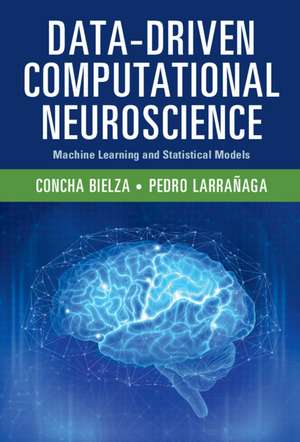Data-Driven Computational Neuroscience: Machine Learning and Statistical Models
Autor Concha Bielza, Pedro Larrañagaen Limba Engleză Hardback – 25 noi 2020
Preț: 596.24 lei
Preț vechi: 745.30 lei
-20% Nou
Puncte Express: 894
Preț estimativ în valută:
114.09€ • 119.12$ • 94.42£
114.09€ • 119.12$ • 94.42£
Carte disponibilă
Livrare economică 15-29 martie
Preluare comenzi: 021 569.72.76
Specificații
ISBN-13: 9781108493703
ISBN-10: 110849370X
Pagini: 708
Ilustrații: 210 b/w illus. 40 colour illus.
Dimensiuni: 185 x 259 x 43 mm
Greutate: 1.5 kg
Editura: Cambridge University Press
Colecția Cambridge University Press
Locul publicării:New York, United States
ISBN-10: 110849370X
Pagini: 708
Ilustrații: 210 b/w illus. 40 colour illus.
Dimensiuni: 185 x 259 x 43 mm
Greutate: 1.5 kg
Editura: Cambridge University Press
Colecția Cambridge University Press
Locul publicării:New York, United States
Cuprins
Part I. Introduction; Section 1. Computational Neuroscience; Part II. Statistics; Section 2. Exploratory Data Analysis; Section 3. Probability Theory and Random Variables; Section 4. Probabilistic Interference; Part III. Supervised pattern recognition; Section 5. Performance Evaluation; Section 6. Feature subset selection; Section 7. Non-probabilistic classifiers; Section 8. Probabilistic classifiers; Section 9. Metaclassifiers; Section 10. Multi-dimensional classifiers; Part IV. Unsupervised pattern recognition; Section 11. Non-probabilistic clustering; Section 12. Probabilistic clustering; Part V. Probabilistic graphical models; Section 13. Bayesian networks; Section 14. Markov networks; Part VI. Spatial statistics; Section 15. Spatial statistics.
Recenzii
'With admirable zeal, Bielza and Larrañaga have digested and summarized an entire field, the machine learning methods in computational neuroscience. The critical importance of computational tools to analyze neural data and decipher the neural code has been emphasized by the US and international BRAIN Initiatives and this book provides a sure and solid step in this direction.' Rafael Yuste, Columbia University
'Data-Driven Computational Neuroscience is an outstanding treatment of modern statistical data analysis and machine learning for neuroscience. Illustrating each method by real world use-cases, this book is unique as a hands on and comprehensive presentation of technique and analysis. The result is a fine text and resource that treats many important but less well-known aspects of the practice.' Michael Hawrylycz, Allen Institute for Brain Science
'This book provides us with an outstanding text dealing with the multiple applications in modern neuroscience of statistical and computational models learned from data. There is no doubt that new neuroscience technologies and computational neuroscience methods will make it possible to define the structural and functional design of brain circuits and to determine how these designs contribute to the functional organization of the brain. This book contains numerous examples of the current applications of computational neuroscience in various fields of neuroscience, presented in such a way that it is easily accessible to those who are not experts in the field. Therefore, the book also represents an excellent opportunity for neuroscientists from all fields to be introduced to this fascinating world of computational neuroscience, expertly guided by Concha Bielza and Pedro Larrañaga - two eminent scientists specializing in computer science and artificial intelligence.' Javier DeFelipe, Instituto Cajal and Centro de Tecnología Biomédica
'In our world of Big Brain Initiatives and Big Data, this encompassing book provides the much-needed bridge between these two 'Bigs'. Data-driven computational and statistical methods are admirably presented and exemplified, providing new insights on fundamental challenges such as classifying neurons into types, uncovering the neuronal code and unveiling principles of brain-connectivity. This book is a must.' Idan Segev, The Edmond and Lily Safra Centre for Brain Sciences, The Hebrew University of Jerusalem
'Data-Driven Computational Neuroscience is an outstanding treatment of modern statistical data analysis and machine learning for neuroscience. Illustrating each method by real world use-cases, this book is unique as a hands on and comprehensive presentation of technique and analysis. The result is a fine text and resource that treats many important but less well-known aspects of the practice.' Michael Hawrylycz, Allen Institute for Brain Science
'This book provides us with an outstanding text dealing with the multiple applications in modern neuroscience of statistical and computational models learned from data. There is no doubt that new neuroscience technologies and computational neuroscience methods will make it possible to define the structural and functional design of brain circuits and to determine how these designs contribute to the functional organization of the brain. This book contains numerous examples of the current applications of computational neuroscience in various fields of neuroscience, presented in such a way that it is easily accessible to those who are not experts in the field. Therefore, the book also represents an excellent opportunity for neuroscientists from all fields to be introduced to this fascinating world of computational neuroscience, expertly guided by Concha Bielza and Pedro Larrañaga - two eminent scientists specializing in computer science and artificial intelligence.' Javier DeFelipe, Instituto Cajal and Centro de Tecnología Biomédica
'In our world of Big Brain Initiatives and Big Data, this encompassing book provides the much-needed bridge between these two 'Bigs'. Data-driven computational and statistical methods are admirably presented and exemplified, providing new insights on fundamental challenges such as classifying neurons into types, uncovering the neuronal code and unveiling principles of brain-connectivity. This book is a must.' Idan Segev, The Edmond and Lily Safra Centre for Brain Sciences, The Hebrew University of Jerusalem
Notă biografică
Descriere
Trains researchers and graduate students in state-of-the-art statistical and machine learning methods to build models with real-world data.
